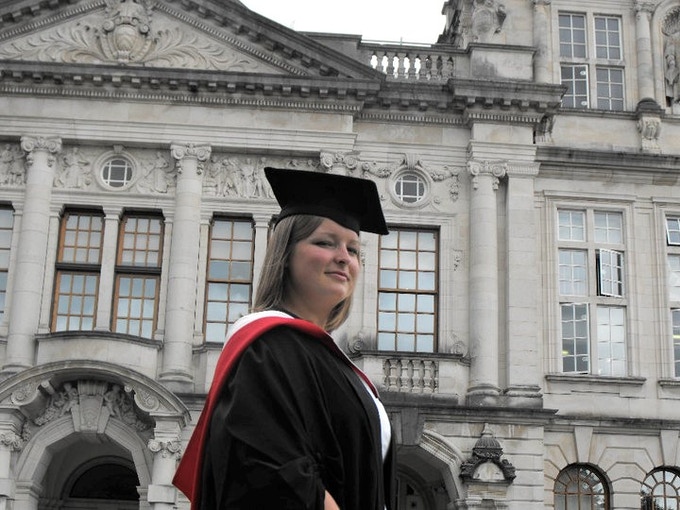I felt I couldn’t justify talking about a depressing subject such as depression without also talking about the recovery process. Especially at a time when so many people are experiencing mental health problems due to COVID-19.
Before I do that though, I just wanted to round up last week’s blog by saying that I did get a degree – a 2:2 BSc in Molecular Biology. Goodness knows how that happened but I did it and it stands testament that you can do anything if you put your mind to it.

But putting your mind and body through such a harrowing experience as that requires a lot of love, attention and therapy to bring it back in balance! I’m going to tell you the good, the bad and the ugly coping strategies that I have found over the last 14 years of my mental health journey.
I hope that by sharing my story it helps you come to terms with anything you might be going through and that you find the help you need. I’ll leave some resources at the bottom of the page if you want to dive deeper into any of the things I talk about.
It’s another long blog, so strap in and enjoy the ride! There’s a tactical photo break half way as a treat for those committed enough to get to the end! Some of these images might make an appearance in the 2022 calendar which is part of the rewards on my album Kickstarter campaign (have you taken a look yet?!)
Let’s start off with The Bad and The Ugly… I’ll make it funny I promise!
The Bad & The Ugly
Hair Pulling, Nail Biting and Skin Picking
“It was so stressful I was pulling my hair out”
“What a nail biting moment!”
Some of my earliest memories of dealing with stress and anxiety involve these common coping mechanisms. For me the habits are hardwired in and I still do them to this day as a way to relax or release pent up stress and energy.
I first remember tearing out my eye brows and eyelashes when I was in middle school. The change from first to middle school really shook me up, plus I already mentioned the bullying episode.
There’s just something about rubbing a freshly plucked eye lash across my top lip which gives me a short burst of calm, but it’s so short lived that I end up in a repetitive loop. And before long, you’re walking around the school corridors looking like a member of The Addams Family…
It’s called trichotillomania in case you’ve never heard of it, and it’s A Real Thing. I recognise it in myself as a mild form of self mutilation because of the cysts and scars I have from it.
There’s an inherent, underlying self loathing which is something I continually come up against.
The nail biting used to be constant in childhood. To the point that I’ve slightly deformed my right index finger. My Mum would always try to stop me, saying “you look like you’re having a meal over there” because it most likely did look like I was chewing on a spare rib. She used foul tasting anti biting finger dips, but I’d persevere through that too…
I pick the skin from around my finger and toe nails, many times until it bleeds. Sometimes I’ve gotten minor infections from this hell driven activity. Not good as someone who relies on their digits for their job as an accordionist.
I know it’s crazy, but there are times I just can’t stop to focus on why it’s not actually helping my long term situation, only providing some weird short term relief or distraction.
Why do we as humans find the most unhelpful coping strategies available, and why do they become unhealthy habits and addictions?
Binge Eating
I was formally diagnosed with a binge eating disorder in 2016, but I’ve struggled with overeating and body image all my life.
There are photos of me as a toddler, hiding behind the sofa dipping the strap from my dungarees in a pot of cream I’d stolen from the fridge and sucking it clean. I mean, who doesn’t like a soggy, creamy dungo strap?!
Binge eating is a cruel cycle of:
- Feel like crap (of which there are numerous reasons why)
- Think “ooo food is the answer! Let me order in way more than I could sanely eat in one go”
- Eat all of it in one sitting
- Feel terrible as soon as it’s over
- Pass out
- Repeat
At university and the years following I’d quite regularly binge my way through a whole tub of ice cream, a ‘sharing bag’ of crisps (lol, sharing…), and a bag of chocolate in one sitting. Enough calories to blow your brains out. And I’d eat it like my life depended on it. It wasn’t about savouring flavour and enjoying what you’re eating. No. Its just about piling it in your face as quickly as possible.
It was the sugar high I was searching for, quickly followed by the sugar slump which literally used to knock me out for hours. Just like a meth addiction where I didn’t want to face the world so would inject a tonne of sugar into my bloodstream and let insulin handle the rest. I’d just go and hide in bed and ignore responsibilities and feelings for hours at a time. Day after day.
Hours of my day would be taken up with fantasising about going to the shops, walking down the aisles, scanning the shelves, looking at every sweet treat on offer, what I would choose, filling my basket, paying for it, walking out the shop… every detail I would go over again and again in my head until eventually I gave in to the cravings and went and acted it out.
I’d hate to be seen, I’d wear my hood up around my face, yet knowing all the while I go to the same shop, with the same staff and they must see this behaviour all the time and never say anything.
I ate to avoid my feelings. Feelings I didn’t recognise or understand. I didn’t know how to process them so I chose to hide from them in food. Which, FYI, isn’t recommended.
It got to a point where one tub of ice cream, one bag of crisps, one bag of chocolate just wasn’t enough. So I’d double the order just to get the hit. Just like a drug addict.
This pattern repeated for years and years as more and more situations arose that I just didn’t get, or that hurt me. My weight skyrocketed.
I hated myself for it, and yet was a slave to it as a way to remain semi-functional and suppress my feelings. It’s such a weird paradox. Plus, eating sugary crap seemed to fuel the vicious nail biting habit, which I hate.
Self-sabotage, much?
In 2015, I found support through a local Overeaters Anonymous group. It was incredibly refreshing to listen and share experiences with a group of people who just “get it”.
The liberation in not having to feel shame in explaining your actions, knowing full well they only serve to make you more fat and miserable. There’s no judgement at OA and with the help of others I came to terms with the state of my health and started taking steps to get healthy.
It wasn’t the perfect solution for me, but was a key factor in me seeking a diagnosis – even though all that did was confirm it, not actually provide any long term recovery or support solution. That was still up to me, it seemed.
The Good
Medication
Let me start by saying there are many opinions out there on this subject, and you must make your own educated decisions. Find a doctor you can trust and go from there. Pills aren’t the solution for everyone.
I was officially diagnosed with ‘moderate anxiety and depression’ in 2012. I remember being sat in the waiting room of my doctor’s surgery, hunched up in the biggest jumper and coat I owned at the time, just wanting to feel some sort of warmth and comfort. I was in a bleak spell where the world just seemed dull and gray 24/7.
The receptionist handed me a clipboard with a bunch of poorly photocopied sheets on. The ink was faded, and the print alignment was askew so some bits of the mental health survey were clipped off. Clearly this was a frequently and hurriedly replicated form. To be presented with something so poorly produced felt utterly careless.
I felt I was just a sheep to the dip. Another statistic.
As this was the very first step I had to take in my diagnosis, in my fragile state I already felt I was a nuisance to the system – to be wasting paper and ink. No one cared enough to even present me with a clear form to fill in from which a diagnosis could be made.
I just didn’t want to be there and yet felt it was the only way to get well. Opening your mouth and saying that you’ve not been well and everything seems hopeless is one of the bravest steps you can take in life.
I remember thinking “how can I say all that I need to say to convince her just how bad it’s been in just 10 minutes?” Despite the lack of eye contact or feeling of sincerity from my GP, I seemed to say the right things, so she rather forthrightly proclaimed me as depressed, hastily wrote me a repeat prescription for Citalopram and showed me the door.
All I can say is that I hope mentally unwell people these days are treated with a lot more respect and dignity than I was. I think the understanding is there now.
Citalopram took some getting used to – about a fortnight of headaches and swimmy head for me. But after that, it was fine.
I still experienced anxiety and depression, but not to the same degree that I did before medication. I also only ever saw it as a temporary ‘crutch’ and not a permanent fix. I think it’s important to keep in mind that you can’t expect a cure from popping a pill everyday – much as that would be nice!
It enabled me to live a reasonably stable life, and during this time I went to art college and built up a business from scratch whilst seeing a therapist to help deal with the thought patterns and self esteem issues which lead to bouts of depression.
I started weaning myself off in 2016, after having repeat after repeat with very few check ups. I’d heard a GP on the radio say that it wasn’t good to be on it long term and I figured I was ready to try riding without stabilisers so I gradually cut down my dose over a year.
Do check with your GP and don’t come off your meds all at once! I was cutting down 10mg at a time over a period of 12 months for a pretty smooth and painless transition without withdrawal symptoms. It felt good to be in control of the process, pausing cut downs when I needed an extra crutch.
PHOTO BREAK!
Please enjoy these Autumnal images taken on a ramble to Lud’s Church, Peak District, Derbyshire on Saturday 7th November 2020. The cheerfulness of the yellow against the drab, wet stone really caught my eye.
Psychotherapy
Let’s just start by saying – we all need therapy. We’ve all experienced stuff in our lives that leaves unanswered questions and tears at our heartstrings which require professional help to get a better perspective on. So please seriously consider it if you’re going through stuff.
I highly recommend paying to see a private therapist. Much shorter waiting times to be seen and in my experience, a much better service.
This website was recommended to me and has been a useful resource for finding accredited professional psychotherapists over the years:
British Association for Counselling and Psycoptherapy
After the mental breakdown at uni, I spent a good many years basically waiting for my family to get me the help I required. I must’ve done a pretty good job of covering it up (sneaking out for biscuits in the middle of the night for a stealth binge sesh) because the help never came.
But then, I never asked for it… so I took it upon myself to seek the answers I required.
Why was all this crap happening to me over and over again? Why did I get low?
I saw my first therapist in 2012 after I was officially diagnosed with anxiety and depression. She helped me through a raft of different things from playground issues in my childhood to some of the relationship and attachment issues I experienced at university and at home with family. I saw her every week for just over 4 months and then on and off again periodically for another year as other issues occurred in life.
In 2016 as a romantic relationship was failing, and I couldn’t fathom why, I started reading about CBT and was using it with no great effect. I started seeing a therapist again. He worked in quite a different way to my previous therapist but was ever so helpful in helping me to unpack my co-dependency and move past some brain concrete.
The inevitable happened and prompted by an extremely painful break-up, I started seeing a new therapist 2016-2017 in a much longer stint of almost 9 months. I just needed some help understanding why the relationship had fallen apart, despite our best efforts to keep it together. I learned a lot about anxious-avoidant attachment and being able to open up about my feelings with those closest to me rather than bottle them up and hope they go away.
I learned that I categorised feelings as ‘good’ and ‘bad’ and actually didn’t have any way to express how I felt. Which is a very odd thing to say as an intelligent, sentient being. But yeah, I didn’t know what feelings I was feeling or how to talk about them which made me very insecure and ‘attach’ onto other people for reassurance.
She approached sessions from an Acceptance and Commitment Therapy (or ACT) point of view, which I found more helpful than CBT. I’ll leave some resources down below if you want to find out more.
Whilst I do understand myself a whole lot better now, this ‘feeling the feelings’ thing can still be tricky.
I’ll come back to this in a later blog as new info has shed light on why this is likely the case.
It wasn’t all great… I got referred to a local NHS counsellor at one point and that was very ‘sheep dippy’. I felt as though they were trying to categorise me, file me away in some way, and get me through the system incredibly quickly. I didn’t feel listened to and was basically sent away with a worksheet to complete each time, which was very unhelpful.
Through each stage of therapy I feel as though I learned a whole heap about myself, strategies for how to deal with destructive thought patterns, and how to carve out the sort of life I want to lead. You can’t put a price on that, in my opinion.
Hypnotherapy
Life seemed to get a bit more ‘normal’. The usual cycles of anxiety and depression still came and went, but I got used to it and had somewhat resigned myself to living with it.
Still avoiding certain feelings and not having the function to communicate all the time what’s happening. This doesn’t go hand in hand when you run a business – but I’m lucky to have had a loyal following who’ve listened, empathised and stayed by me over the years. (Thank you to you all, you know who you are)
I’d had the occasional panic attack during the final months of my relationship breaking down – once in the supermarket, once at an airport and once when I visited Oslo for a day of solo touristing.
They’re not nice, especially if you’ve never experienced one before. Your heart races, and your chest tightens up. Your breath gets shallower and shallower. Cold sweat breaks out and your eyes dart about the place looking for an escape but makes you dizzy instead.
The anxiety grows exponentially and uncontrollably like a nuclear meltdown.
My cure for this? Food. Always.
“Let’s just push those feelings a little deeper down and try to calm ourselves by shoveling some pastries down our throat.”
Top advice (not). No seriously, don’t treat a panic attack with pastries. The flaky shards may choke you whilst you struggle to breathe.
I began to develop severe anxiety which escalated into panic attacks in the couple of years following the breakup. Especially surrounding events where I might see my ex. I had no logical explanation for it to be happening and that worried me. So much about anxiety is illogical.
The binge eating had become chronic and my weight had shot up. I’d put 2 stone on in a year through doing little to no exercise. I was at one with the sofa on many occasions.
I didn’t like the way the anxiety was getting the better of me so one day late in 2018 I had the passing thought to try hypnotherapy.
It literally came out of nowhere. I found an anxiety specialist in Derby who had glowing reviews for essentially ‘curing’ anxiety (my words, not his).
It took me a long time to open up to him. I felt very vulnerable lying back on a couch and closing my eyes, allowing his words to put me into a deep trance where the work of hypnosis is done.
But I trusted in the process and over the space of 5 months, I’d got to a place where I was able to approach my ex at a festival and have a short conversation with ZERO anxiety.
I was cured! It felt incredible.
We then took another 8 months working through my mind’s ‘fight or flight store cupboard’ and one by one swept the cupboard clean.
I’d never felt so free to live a life without anxiety! I had energy to do things now. We also got a long way into kicking the binge eating, hair pulling and nail biting habits but those are unfortunately still with me to some degree (my fault for not following through with the homework… we can’t all be perfect!).
My hypnotherapist basically sat down with me and said “If you didn’t have anxiety holding you back, what’s the life you’d build for yourself?” and I’m still growing towards this. I’m building a life for myself that I’m proud of and I’ve arrived at a place where I can do good for others. That feels fantastic!
Each therapist I’ve worked with has provided me with a safe space in which to share my innermost secrets, desires, aspirations, shame, loathing, fears – all of it. The professional is there to catch all the jigsaw pieces you throw at them and assemble the puzzle in a different, and more positive, way.
I can’t recommend professional, private psychotherapy enough!
Mindfulness, Reiki and Pilates
I couldn’t let this blog go out without a quick word on how these three things have brought me so much mental freedom, control and peace during some of the darkest times post-university.
I’ve never given up on my search for wellness…
I was attuned to Reiki level 1 in 2015 by a dear friend, Jan Alton. This enables me to perform Reiki on myself. I find it a very quick way to release deep tension I’m not aware of and find deep relaxation. After a session, I usually feel energised and ready to do the things I’m avoiding or deeply restful and snoozy.
Mindfulness in a similar vein is a form of meditation. I use it as a way to bring my focus into the here and now which helps me not to worry about the past or the future – things we can’t control.
I used to get very invasive, negative and self destructive thoughts which would occupy my mind for hours at a time. These used to fuel spiralling anxiety and over a period of weeks, would see me in another depressive episode, unable to get out of bed. So anything to avoid that is magnificent!
I also use mindfulness as one of the principles in my method for teaching the melodeon (read more about that here)
Pilates has been a more recent discovery and brings the focus and breath to the physical body. It’s a workout without feeling like a workout! I started seeing my instructor, Chloe Bircher, after getting bad back pain after a period of depressive immobility and playing the melodeon.
I love that I am able to feel the benefit of a short session immediately. My body is stronger and freer and so is my mind. I’m still working on embedding this exercise into my weekly routine but it’s a lot better than it used to be!
Summary
Do I feel cured permanently? No, of course not. Anyone and everyone is susceptible to anxiety and depression at any point in life, and I don’t feel I’m safeguarded against future hassle just because I’ve spent thousands of pounds and many hours sat in therapy sessions!
The point is that I know myself better now and I know what I respond best to. I know what to look out for and how to better take care of myself. I’m a more confident person and I’m more prepared to speak up about things that don’t feel right.
14 years down the line, I’m still growing just as everyone is. I look for the strategies that make sense and work for me and that’s the real key thing here.
I hope I don’t bite my nails and pluck hair for the rest of my life. I know those coping strategies don’t serve me in the best interest. Thing is, whilst I know what’s good for me – stuff like mindfulness, exercise, and reiki – I’ve not yet managed to build it into everyday life. I’m a slow processor and do things in my own time! I have every faith I’ll get there one day.
Being able to stop and take a moment this year has been a real gift. I’ve realised so much about myself that was being masked before by a busy on-the-go lifestyle and I’m not at all convinced I want to return to that.
My health, well-being, routine, self-care, eating and exercise this year has been the best it’s ever been my whole adult life. That’s a mega achievement for me, as someone who has really struggled with all these ‘life basics’ since leaving the comfort of a family home and school environment.
I look forward to spending the rest of my 30’s exploring the world, it’s people and places and the connections we all share but don’t necessarily talk openly about. We can learn so much from each other with a little encouragement to open up.
What have you taken away from reading this, other than potential eye and neck ache?! I’m curious.
Further reading
Here are some books and resources which have armed me with knowledge over the years:
Sane New World: Taming the Mind by Ruby Wax








One thought on “From Darkness Comes Light: Coping Strategies – The Good, The Bad & The Ugly”
Comments are closed.